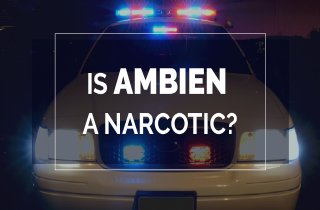ARTICLE OVERVIEW: Yes and no. Under the general definition of “narcotic”, Ambien could be considered an illicit drug when used outside of prescription guidelines. However, Ambien is not classified as a medical narcotic in the U.S. More on the distinctions here.
TABLE OF CONTENTS
- Definitions
- What Is Ambien?
- Classification
- Side Effects
- Addictive Potential
- Risks
- Drug Problems
- How to Get Help
- Final Thoughts
- Your Questions
Definitions
The terms “opiate”, “opioid”, “illicit”, and “narcotic” are often used to mean the same thing. However, these terms are distinctly separate and should not be used in the same way. Most people do not even know the difference between opiate and opioid. They use the term opioid for both natural or synthetic (or semi-synthetic) substances that act at one of the three main opioid receptor systems (mu, kappa, delta).
The term “narcotic” comes from the Greek word for “stupor”, and originally referred to a variety of substances that dulled the senses and relieved pain. Medically speaking, a narcotic falls into the class of drugs that offer pain relief: opiates and opioids. However, due to the negative association the term narcotic has with illegal drugs, it has fallen out of use in medical settings. [1]
Because these kinds of “narcotic drugs” have the potential for abuse and addiction, prescription painkiller use is regulated by the Controlled Substances Act in the United States. Likewise, because Ambien is considered addictive, it is also technically a “narcotic” drug…mainly when it is taken in ways OTHER THAN PRESCRIBED.
Ambien can be a narcotic when:
- You crush, snort, or inject Ambien.
- You sell Ambien to friends, family, or acquaintances.
- You take more Ambien than prescribed.
- You use it and do not have a prescription for it.
What Is Ambien?
Ambien is the brand name for zolpidem, a non-benzodiazepine sedative-hypnotic, and central nervous system depressant, that is mainly prescribed as a sleep aid. Ambien is usually prescribed for short-term treatment of insomnia and can be taken for up to 4 weeks to treat sleep problems. After drug use, therapeutic effect occurs within 30-60 minutes, and therefore it is highly recommended that patients only take the drug directly before sleep. [2]
Classification
According to the Drug Enforcement Agency’s (DEA) drug classification that is regulated under the Federal Controlled Substances Act (CSA), Ambien is a Class IV substance on par with other prescription medicines with a known medical use. Drugs in Schedule IV have low potential for abuse, limited physical, and limited psychological dependence relative to the drugs or other substances in Schedules I, II, or III. The drugs in Schedule IV also have current medical use. [3] [4]
Side Effects
Following a prescription dosage regimen, the intensity of Ambien side effects is fairly low. Note here that Ambien is rarely supposed to be prescribed for more than 2 weeks at a time. As per the FDA-approved Ambien label, prescriptions should be followed up by an appointment at 30-days in order to evaluate the medicine’s effectiveness.
Still, the most common side effects for Ambien are sluggishness, fast fatigability, dizziness, disorder of equilibrium, muscle weakness, and daily sleepiness. These side effects tend pass with the end of the drug use and the medical intervention is not necessary during their appearance.
Is Ambien Addictive?
Yes, Ambien can be addictive.
The American Psychiatric Association’s DSM-V identifies some of the symptoms of a sedative, hypnotic, or anxiolytic use disorder as [5]:
- Abandonment of once-enjoyed activities in favor of obtaining and using the substance.
- Compulsive desire to obtain the substance.
- Continued use despite negative social, interpersonal, legal, or financial consequences caused by Ambien use.
- Taking the drug for longer than intended.
- Unsuccessful attempts to cut down or cease use.
However, addiction should not be confused with dependence or tolerance. After the daily administration of Ambien for a couple of weeks or more, the central nervous system adapts to the presence of Ambien. This is a process called “dependence”, and is characterized by withdrawal symptoms upon lowering doses or quitting Ambien.
Furthermore, people who take Ambien for more than a few weeks at a time can develop “tolerance”, defined as the need to increase the dose to achieve the same initial therapeutic effect. Although research has shown that tolerance and dependence do not usually occur after just a few weeks of therapeutic use, these conditions do make quitting more difficult and can add to diagnostic criteria for a substance addiction.
Risks
According to FDA-approved Ambien prescription information, long-term use of Ambien presents higher risks and more danger. This is why Ambien should only be taken immediately prior to going to bed and for a period of time less than 14 days. Plus, the FDA outlines risks of taking sleeping pills and has put out a recommended lowered dose for zolpidem in early 2018. Even more, Ambien shows additive effects when combined with alcohol and the central nervous system depressant drugs. You should never mix Ambien with other drugs or drink when using it. [6] [7]
Furthermore, age is important. Ambien should not be prescribed to children 14 years old, or younger. In fact, the safety and effectiveness of zolpidem have not been established in pediatric patients. As with other sedative/hypnotic drugs, Ambien should be administered with caution to persons exhibiting signs or symptoms of depression. Suicidal tendencies may be present in such people and protective measures may be required.
Some of the most worrying side effects of Ambien use include decreased inhibition such as aggressiveness and extroversion that seem out of character. These symptoms may be similar to effects produced by alcohol and other central nervous system depressants. Additionally, people can forget things they have done while under the influence of the drug; sleep walking, conversations, and even driving while on Ambien have been reported. Further, visual and auditory hallucinations (seeing things or hearing voices that do not exist) have also been reported as well as behavioral changes such as bizarre behavior, agitation and depersonalization.
Everyone who takes Ambien should be cautioned against engaging in hazardous occupations requiring complete mental alertness or motor coordination such as operating machinery or driving a motor vehicle after ingesting the drug. Due to the rapid onset of action, Ambien can leave you operative but unconscious. To reduce the risk of harm, only take Ambien as prescribed and before you plan to sleep.
Signs of a Drug Problem
Can you not get to sleep without Ambien?
Do you use Ambien to calm down?
Have you used Ambien without a doctor’s prescription?
If you afraid that you might be addicted to Ambien, honesty is required. In order for addiction to occur, you must experience at least one of the four characteristics of addiction:
- You begin to crave Ambien.
- You cannot stop taking Ambien.
- You continue to take Ambien despite negative consequences.
- You take Ambien for non-medical or recreational purposes.
Abusing Ambien recreationally or in doses/ways other than prescribed can lead to dependence and addiction.
How to Get Help?
Always seek medical supervision when you want to come off Ambien.
First, you should talk to your prescribing doctor about concerns you have about Ambien. S/He can help you identify alternative ways to treat insomnia while you start withdrawing from Ambien. Ambien withdrawal is most successful when you follow a tapering protocol as you stop taking sleeping pills. Slowly lowering doses over time can help reduce the intensity of symptoms like rebound insomnia, anxiety, and paranoia that can occur. So, ask your doctor to set up an individual tapering schedule for you. [8]
You can also ask for help from any one of these medical or behavioral healthcare professionals:
- A drug addiction specialist M.D.
- Detox clinics.
- Licensed clinical social workers.
- Psychiatrists.
- Psychologists.
If you need help, know this: Both physical or psychological dependence on Ambien are treated as medical conditions. There is no need to feel ashamed. Simply start looking for referrals and get the help you need.
Final Thoughts
Q: So, is Ambien a narcotic?
A: Yes, officially it is a narcotic.
Ambien is legally classified as a narcotic and a Schedule IV substance in the Controlled Substances Act. While most schedule IV drugs, substances, or chemicals are defined as drugs with a low potential for abuse and low risk of dependence…Ambien becomes a narcotic when it is used outside of prescription guidelines. [9]
Your Questions
Did we answer most of your questions about Ambien? We hope so. If you have additional concerns about this topic, please share them in the comments section below. We will do our best to respond to you as soon as possible.
Moreover, if we do not know the answer to your question, we will refer you to someone who can help you. Do not hesitate to write us, we are here to help. And we love to hear from our readers!











Related Posts